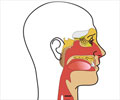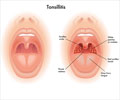- Sore throat - (https://www.mayoclinic.org/diseases-conditions/sore-throat/symptoms-causes/syc-20351635)
About
Sore throat is a common symptom that usually affects people during a weather change. It is often caused by a viral infection, though bacteria can cause severe sore throat followed by serious complications.
Sore throat or pharyngitis is one of the most common symptoms for which a person visits a general practitioner or an ENT specialist. Often, triggered by weather change during late winter and early spring, this is a symptom that affects the young and old alike.

In a sore throat, the back part of the mouth or throat is inflamed. In addition, the tonsils are often affected especially in children, resulting in tonsillitis.
The cause behind the sore throat is usually diagnosed based on the history and examination of the throat. A throat swab is often taken to detect the infective pathogen.
Causes of sore throat are listed below:
Infection: The most common cause of sore throat is infection, which may be a viral or a bacterial infection.
- Viral infection: A viral sore throat is usually accompanied by symptoms like fever, fatigue, generalized aches and pains, runny nose, and red eyes. The back of the throat is usually red on examination. In addition, the patient may also suffer from symptoms like vomiting, pain in abdomen and diarrhea; such symptoms are seen more commonly in children. Viruses commonly associated with sore throat are the influenza virus or the viruses causing common cold. Other viral infections that may result in sore throat are:
- Infectious mononucleosis: Infectious mononucleosis is a type of infection caused by a virus called Ebstein-Barr virus. Besides sore throat, the patient also experiences fever and enlarged lymph nodes especially at the back of the neck. The diagnosis may be confirmed by some tests, namely white blood cell count, Monospot test or IgM antibody test.
- Measles and chicken pox: Viral infections like measles and chicken pox are preceded by a sore throat and fever. These conditions are diagnosed based on the appearance of the characteristic rash.
- Bacterial infection: Sore throat may be caused by bacteria like Group A Beta Hemolytic Streptococcus. Symptoms associated with a viral infection like a clear runny nose and red eyes are usually absent. Some of the bacteria that may result in a sore throat are listed below:
- Group A Beta Hemolytic Streptococci: Group A Beta Hemolytic Streptococci are common causes of bacterial throat infection. The throat appears red and swollen, with enlarged lymph nodes in the front of the neck. The tongue may be red with a white coating. The diagnosis can be confirmed using tests called the rapid antigen test or throat culture. Streptococcal infection could develop into complications like an abscess around the tonsils (peritonsillar abscess), and rarely rheumatic fever and kidney disease. Other strains of streptococci may also cause pharyngitis. Scarlet fever may be associated with streptococcal pharyngitis, which presents as a rash along with the pharyngitis.
- Gonococci: Gonococci cause gonorrhea, a sexually transmitted disease. Thus, gonococci can cause pharyngitis in individuals practicing oral sex. The throat appears red with greenish exudates (secretion), along with fever. The infection can be confirmed with a positive throat culture.
- Diphtheria: Diphtheria can also cause a sore throat, though the number of cases has come down due to active immunization. Patients of diphtheria show the presence of a membrane over the tonsils, throat or nasal passages. An attempt to remove the membrane results in bleeding. Lymph nodes in the neck are tender.
- Whooping cough: Whooping cough is an infection due to bacteria called Pertussis. The cough is characteristic and has a whooping sound.
- Fungal infection: Fungal infection of the throat may be caused by a fungus called Candida albicans; the mouth infection by the fungus is also called oral thrush. It is characterized by whitish patches in the mouth. It more commonly affects individuals who have low immunity including HIV patients, diabetics and people on inhalation steroids for conditions like asthma.
Other causes of sore throat are:
- Kawasaki disease: Kawasaki disease is a condition characterized by sore throat in young children, along with other symptoms like fever, conjunctivitis (red eyes) and enlarged lymph nodes. In addition, the person suffers from skin-related conditions like cracked red lips, rash and swelling of hands and feet, and peeling of palms. The causative organism is not known.
- Gastroesophageal reflux: Gastroesophageal reflux is a condition where acid from the stomach regurgitates into the esophagus or food pipe and sometimes up to the throat causing a sore throat.
- Postnasal drip: Excessive mucus secretion following an allergic reaction or a sinus infection leads to dripping of secretions into the throat; this is referred to as postnasal drip. A postnasal drip can result in sore throat.
- Lyme disease: Lyme disease is a condition that spreads through the bite of an infected tick. One of the possible symptoms of Lyme disease is sore throat. Diagnosis is based on a blood test.
- Allergies: Allergies can cause sore throat either directly or due to the accompanying postnasal drip.
- Irritants: Irritants like cigarette smoke, pollution and dust can cause sore throat through their direct irritant action. In addition, drinking of alcohol and eating spicy foods can also irritate the throat.
- Thyroiditis: Inflammation of the thyroid, called thyroiditis, may be associated with sore throat. Sore throat may also occur during radioiodine treatment for thyroid disorders.
- Straining of voice: Straining the voice due to loud yelling at an event can cause a sore throat.
Frequently Asked Questions (FAQs)
1. Which doctor should I visit in case I suffer from sore throat?
You should visit an ENT (Ear-Nose-Throat) specialist or general practitioner in case you suffer from sore throat.
2. What is the difference between pharyngitis, tonsillitis and laryngitis?
Pharyngitis is the inflammation of the throat region, which also includes the tonsils. Tonsillitis is inflammation and often enlargement of the tonsils. Laryngitis is inflammation of the voice box that results in a change of voice.















